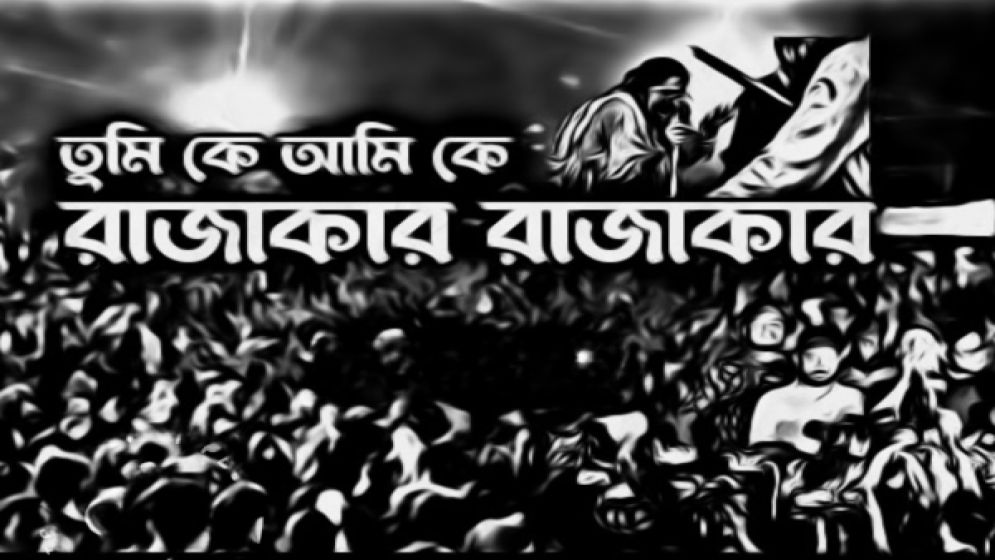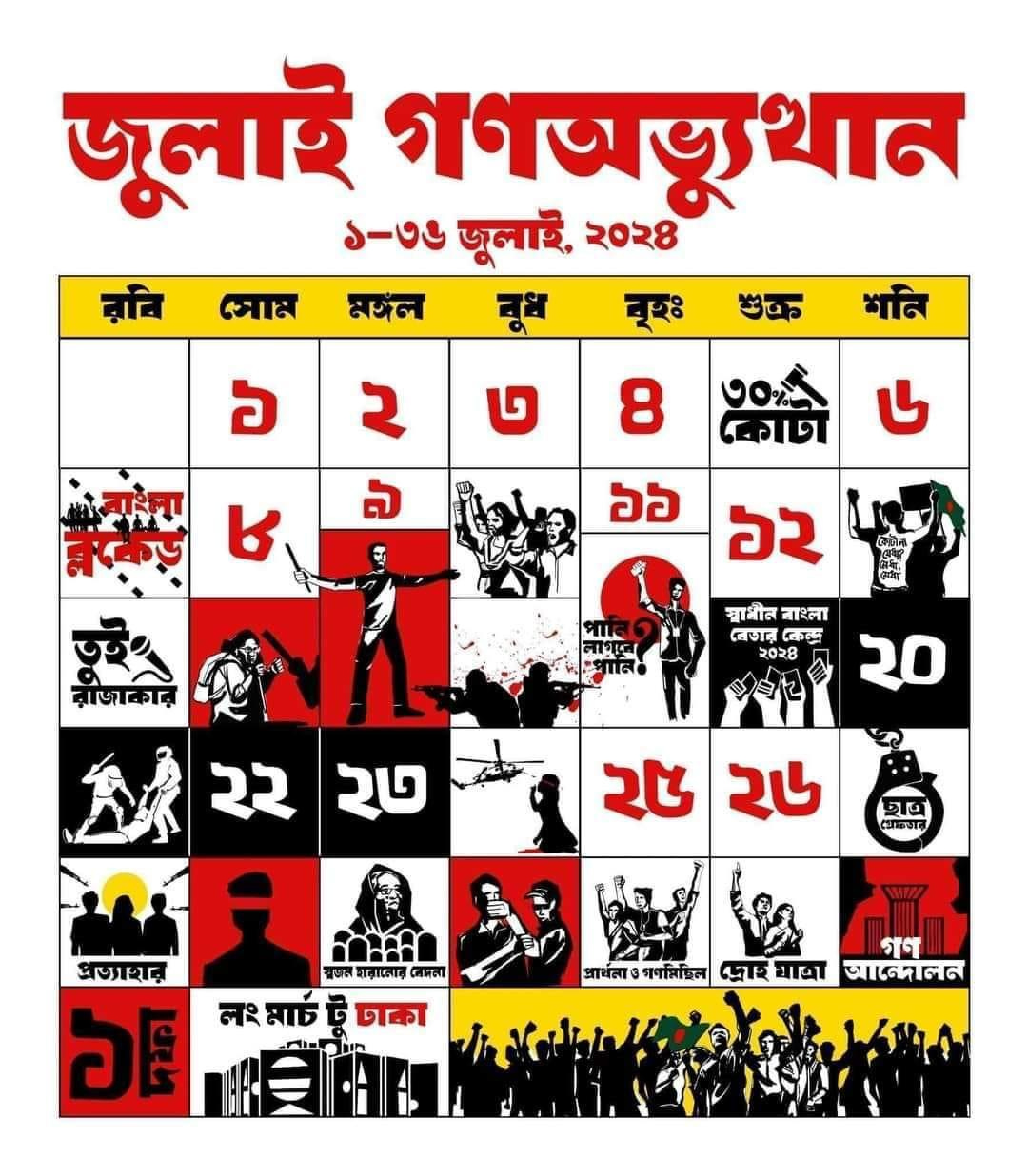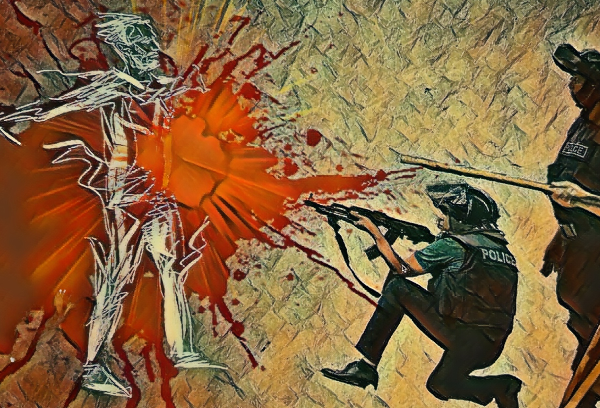Misunderstanding and misinterpreting the slogans of the “July Revolution” will only deepen divisions and lead to conflict

On the night of July 14, after Sheikh Hasina
referred to “descendants of the Razakars,” I was struck by a profound feeling.
During the 2018 quota movement, students had defied Matiya Chowdhury’s use of the “Razakar” label by boldly displaying “Razakar” on their chests.
That evening, as I sipped tea at TSC, I wondered: What happens next? Will the students challenge Hasina? And if they do, what will come of it? I experienced a deep, uncertain sense of anticipation and joy.
"Who are you and who am I?
Razakar, Razakar"
That night, the slogan emerged from different halls of Dhaka University and swiftly spread from one hall to another. Once everyone gathered near the Raju sculpture, DU Chhatra Dol member Pranto Mahmud made a key addition, which eventually became another iconic slogan of the movement:
"Who said, who said?
Autocrat, autocrat"
It was further joined by:
"We wanted rights
But became a Razakar
I am not, you are not
Razakar, Razakar
Who is a Razakar, who is a Razakar
You are a Razakar, you are a Razakar"
All these slogans were chanted that night at Dhaka University. There is documentation of it.
 Understanding the underlying issue of
‘Razakar’ slogans
Understanding the underlying issue of
‘Razakar’ slogans
For the past 15 years of misrule, the Razakar label was the chief weapon of fascism and its accomplices. That night, the students of Dhaka University risked becoming the eyesore of the entire state apparatus and rendered this weapon ineffective.
They shattered the most significant repressive
ideological apparatus of fascism.
The country, mentally, essentially gained its independence that day.
But some questions remain. Why did the initial slogan, “Who are you, who am I / Razakar, Razakar,’ get extended later on? Why were other slogans added that night? And why did the students accept this? This needs to be understood clearly.
The slogan “Who are you, who am I / Razakar, Razakar” was primarily used by the students to mock and dismantle the narrative of the oppressors. This is evident from the interview given by Naheed Islam on July 15.
Regarding the 1971 Liberation War, and consequently the ‘Razakar’ issue, the slogan wasn’t meant to fulfill the Jamaat-Shibir's ideological or theoretical position (whether they still hold that position, I don’t know).
It wasn’t intended to recreate or affirm that perspective. The agenda of the students was not to deny 1971, but to reclaim it. Coordinators emphasized this point strongly even after the uprising during the state-building process.
As a result, the slogan “Who are you, who am I / Razakar, Razakar” also created a dilemma.
The students did not want to subscribe to Jamaat’s “Razakar project” while moving away from Awami fascism. That’s why other slogans, including “Who said, who said / Autocrat, autocrat,” were added later.
You’ll notice that many people also reject this line. They prefer to simply declare themselves as ‘Razakars’ and leave it at that. There’s a political aspect to this: it pertains to Jamaat's perspective on 1971.
However, the line “Who said, who said…” was the most decisive slogan of the movement, even more so than “Who are you, who am I…”. Why? Because through this slogan, for the first time, students gained the courage to label Sheikh Hasina as an “autocrat.”
They had already shown the courage to call themselves ‘Razakars’ back in 2018. But this was the first time they dared to call Hasina an ‘autocrat.’ This was essentially the turning point.

Ambiguity or no ambiguity?
The slogans chanted on the night of July 14 were intended to separate the movement from Jamaat's 1971 narrative, and these slogans were created by the activists themselves.
Starting from July 15, the slogans "Who are you, who am I / Razakar, Razakar / Who said, who said / Autocrat, autocrat" were heard everywhere. Other slogans also spread across various locations. These slogans played a crucial role in the success of our movement, forming an integral part of its history.
Focusing solely on one slogan while disregarding the others, or elevating one at the expense of others, is not only a poor practice but also a political maneuver. The key lies not in the individual slogans but in the overarching narrative.
Those who are uncomfortable with the “Who are you, who am I / Razakar, Razakar” slogan or who wish to ignore the other slogans each have their own perspective. Both perspectives were challenged and reshaped by the July uprising, and this should be acknowledged.
Indeed, the slogan “Who are you, who am I / Razakar, Razakar / Who said, who said / Autocrat, autocrat” was both the initial and most popular slogan of the movement, and this fact cannot be denied.
However, there were other slogans as well. They were chanted in various places by different people. Some slogans gained widespread recognition while others did not, but this does not diminish the value or spirit of any of them. All these slogans contribute to the comprehensive history of our movement.
Resentment towards the coordinators is understandable, but this anger should not jeopardize the movement’s history. It is crucial to preserve the unified history of the uprising.
The July uprising does not belong to any single group; it was a confluence of many voices and perspectives. We must uphold this history of convergence and analyze the reasons behind it.
The diverse narratives of history must be respected, and ignoring any aspect would be self-destructive.
—-
Tuhin Khan is a writer, thinker & member of the National Citizen Committee

